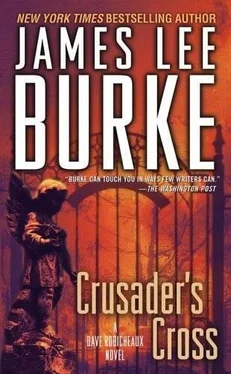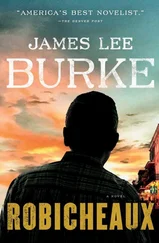The rumors that he did business with the Giacanos were I'm sure true. To what degree was up for debate. In the state of Louisiana, systemic venality is a given. The state's culture, mind-set, religious attitudes, and economics are no different from those of a Caribbean nation. The person who believes he can rise to a position of wealth and power in the state of Louisiana and not do business with the devil probably knows nothing about the devil and even less about Louisiana. Chalons was an enigma, a protean creation bound more to the past than the present, and in some ways a mirror of us all. But the best description I ever heard of Chalons came from his own attorney, who once told me, "Raphael hates lawyers, keeps all his records in his own head, and is a ruthless sonofabitch. But by God he always keeps his word."
I parked my cruiser in the spangled shade of a live oak and was told by a yardman that Raphael Chalons was in the back, down by the bayou, walking his dog. I went around the side of the building, past slave quarters that were used to store baled hay and a cistern that had caved into sticks on its brick foundation. Down the slope, in the sunlight, I saw Raphael Chalons throwing a stick for his pet Rottweiler to fetch. As I approached him, he snapped his fingers at the dog and clipped a leash onto its collar, then stepped on the end of the leash with one foot.
He was a tall, ascetic-looking man, with shiny black hair and a scrolled and waxed mustache, like the one worn by the legendary Confederate naval officer Raphael Sims. His hands had the long, tapered quality of a surgeon's, deeply tanned on the backs, corded with blue veins.
I told him I had been sent by the sheriff to investigate his complaint regarding Clete Purcel. "Did he bother or threaten you in some way, sir?" I asked.
"You're not patronizing me, are you, Mr. Robicheaux?"
"Sheriff Soileau doesn't want someone from our parish threatening people, if in fact that was the case," I replied.
I saw the veiled challenge to his veracity register in his eyes. "If he had threatened me, I would have run him off with a shotgun. Did he offend me? Yes, he did. He made an insinuation an employee of mine put a contract on his life. But I have the feeling you know this man."
"I do."
"So there's a personal agenda at work here?"
"No," I replied, my eyes shifting off his.
"My son thinks you're trying to extract information from my daughter about our family. Is that your purpose, Mr. Robicheaux, besides looking out for your friend's interests?"
His tone had become pointed, slightly heated, and I saw the dog raise its head, a string of slobber hanging from the side of its mouth. The dog was heavily muscled, its hair coarse, the same black, shiny color as Chalons's, with tan markings around its rump and ears. Chalons snapped his fingers and the dog got down flat on the ground and rested its head on its paws.
"There's a hit man in New Orleans by the name of Jericho Johnny Wineburger," I said. "His specialty is one in the mouth, one in the forehead, and one in the ear. He once told me, 'When I pop 'em, I shut all their motors down. Forget life support. They're cold meat when they bounce off the pavement.' That's the guy a cop by the name of Billy Joe Pitts was trying to sic on my friend Clete Purcel."
I could see the offensive nature of my language and its implication climb into his face. He studied the bayou and a powerboat splitting a long yellow trough down its center. Then he bent over and unsnapped the leash from the dog's collar.
Involuntarily I stepped back and rested my palm on the butt of my holstered.45, my heart beating. But Chalons only patted his dog on its head and said, "Go to the house, Heidi."
I watched the dog bound up the grassy slope, then I looked back at Chalons's face. There were long vertical lines in it, the mouth downturned at the corners, as though he had never learned to smile. I took my hand from my weapon, feeling strangely disappointed that he had not forced the moment. I could not begin to guess at the thoughts that went on behind the black light in his eyes.
Then, as though he had read my mind, he said, "Please leave my family alone, Mr. Robicheaux. We've done you no harm."
I went directly from work to New Orleans, driving the four-lane through Morgan City and Des Allemands. I hit rain on the bridge over the Mississippi River, then a full-blown electrical storm as I turned off Interstate 10 and headed up St. Charles Avenue toward the old Irish Channel.
Jericho Johnny Wineburger owned a saloon on a side street between Magazine and Tchoupitoulas, and claimed to have been out of the life for a least a decade. But he had at least a thirty-year history of killing people, and supposedly, with another button man, had taken out Bugsy Siegel's cousin with a shotgun on a train roaring through West Palm Beach. Clete believed Jericho Johnny had turned down the contract on Clete's life either out of fear of Clete or respect for the fact they both grew up in the Irish Channel.
I doubted either possibility. Jericho Johnny had ice water in his veins and I suspect was capable of killing his victim and eating a sandwich while he did it.
The air was cold and smelled of ozone. The streets were flooded, and thunder was booming over the Gulf when I parked in front of his saloon and ran for the colonnade. The only customers in the saloon were some kids shooting pool in back and a white woman in a house robe who slept with her face on her hands at a table. Jericho Johnny stood behind the bar drying glasses while he watched a professional wrestling match on TV. He looked at me and slid a toothpick into the corner of his mouth. "This about Purcel?" he asked.
His words came out in an accentuated whisper, as though they were filtered through wet grit. Some said his vocal cords were impaired when he was a child and he accidentally drank rug cleaner. But I think the story was romantic in origin. I think Jericho Johnny came out of a different gene pool than the rest of us.
"I need the name of the cop who wanted you to clip Clete," I said.
I thought he might give me a bad time, but he didn't. He looked at the backs of his nails. "Pitts," he said.
"But you told him to get lost?" I said.
"In so many words, yeah, I did. You still on the wagon?"
"Why?" I asked.
" 'Cause I'll stand you a beer and a shot if you're not. Otherwise, I'll offer you a cup of coffee. Take the two-by-four out of your ass, Robicheaux."
His accent could have been mistaken for Flatbush or South Boston. He had worked on the docks when he was a kid, and he had silver hair, short, powerful forearms wrapped with tattoos, and a face that could have been called handsome except for the thinness in his lips. He poured me a demitasse of black coffee and placed it on a small saucer with a cube of sugar and a tiny spoon. He saw me look at the woman who was sleeping with her face on her hands. "She lives up the street. She's scared of lightning and can't sleep during an electrical storm, so she comes down here," he said.
"You didn't piece off the work?" I asked.
"I never pieced off a job in my life," he replied.
"Why'd you tell Nig Rosewater about it?"
"I didn't. This cop, this guy Pitts, he went to two or three people in the business about Purcel. I was just one of them. That's how Nig heard about it. I own a saloon today. I live in a nice house out back. I been out of the life a long time now."
"You think somebody else took the contract?"
"Maybe."
"Who?"
"Don't know."
A phone rang in back and he went to answer it. The rain and lightning had quit, and the street was dark and in the light from the saloon I could see the fronds of a banana tree flapping against a side window. The woman who had been sleeping at the table woke up and looked around, as though unsure of where she was. "I want to go home," she said.
Читать дальше












